Pengembangan Game Petualang untuk Pembelajaran Berhitung
Abstract
Abstrak: Penelitian ini menghasilkan media pembelajaran berupa game yang diaplikasikan pada perangkat yang memakai sistem android. Selama ini anak-anak menghilangkan kejenuhan dengan game. Oleh karena itu, perlu dikembangkan media pembelajaran berupa game yang bertujuan agar siswa dapat memanfaatkan waktu luang dengan sesuatu yang berguna. Penelitian ini bertujuan untuk menyediakan media pembelajaran game petualang yang telah divalidasi oleh ahli isi, ahli media dan ahli desain sebagai pendukung pembelajaran berhitung. Metode dalam penelitian pengembangan ini menggunakan metode Penelitian dan Pengembangan (P&P). Penelitian ini menghasilkan data berupa game petualang untuk pembelajaran berhitung yang dilengkapi buku petunjuk penggunaan bisa diperoleh di playstore. Validasi ahli isi sebesar 84,76%, validasi ahli media dan desain sebesar 91,82%, Angket respon siswa terhadap game petualang untuk pembelajaran berhitung mencapai kriteria sangat baik.
Abstract: This study developed a learning media in the form of games that were applied to devices using the Android system. During this time children eliminate boredom with games. Therefore, learning media in the form of games are developed so that students can take advantage of free time with something useful. This research aims to provide adventurous game learning media that have been validated by material experts, media experts and design expert as a support for numeracy learning. The method in this research use the Research and Development (P&P) method. This study produces form adventurous games for numeracy learning that are equipped with user manuals can be obtained at Playstore, Material expert validation is 84,76%, Media and design expert validation is 91,82%. Questionnaire responses of students to the adventurous game for learning to count reached very good criteria.
Abstract: This study produces learning media in the form of games that are applied to devices using the Android system. So far, children get rid of boredom with games. Therefore, it is necessary to develop learning media in the form of games that aim so that students can take advantage of their spare time with something useful. This study aims to provide an adventurous game learning media that has been validated by content experts, media experts and design experts as support for learning to count. The method in this development research uses the Research and Development (P&P) method. This research produces data in the form of an adventurous game for learning arithmetic which is equipped with a user manual which can be found in the playstore. Content expert validation was 84.76%, media and design expert validation was 91.82%, student response questionnaires to adventurous games for learning arithmetic reached very good criteria.This study developed a learning media in the form of games that were applied to devices using the Android system. During this time children eliminate boredom with games. Therefore, learning media in the form of games are developed so that students can take advantage of free time with something useful. This research aims to provide adventurous game learning media that have been validated by material experts, media experts and design experts as a support for numeracy learning. The method in this research use the Research and Development (P&P) method. This study produces a form of adventurous games for numeracy learning that are equipped with user manuals can be obtained at Playstore, Material expert validation is 84.76%, Media and design expert validation is 91.82%. Questionnaire responses of students to the adventurous game for learning to count reached very good criteria.
Keywords
Full Text:
PDFReferences
Adrian, Q. J. (2019). Game Edukasi Pembelajaran Matematika Untuk Anak Sd Kelas 1 Dan 2 Berbasis Android. Jurnal Teknoinfo, 13(1), 51–54.
Amanda, D. D. (2013). Meningkatkan Kemampuan Berhitung Anak Usia Dini Melalui Permainan Book Scavenger Hunt. Universitas Pendidikan Indonesia.
Ardi, A., & Sutabri, T. (2014). Perancangan Dan Implementasi Game Edukasi Marbel Untuk Kurikulum Tingkat Sekolah Dasar. Prosiding Semnastek, 1(1).
Arief, S. (2009). Media Pendidikan, Pengertian, Pengembangan, dan Pemanfaatannya. Jakarta: PT. Rajagrafindo Persada.
Arif, M. (2016). Penerapan teknologi game berhitung untuk meningkatkan kemampuan matematika pada siswa tingkat sekolah dasar. Edutic-Scientific Journal of Informatics Education, 3(1).
Arsyad, A. (2002). Media pembelajaran, edisi 1. Jakarta: PT. Raja Grafindo Persada, 36.
Berta, R., Bellotti, F., van der Spek, E., & Winkler, T. (2016). A tangible serious game approach to science, technology, engineering, and mathematics (STEM) education. Handbook of Digital Games and Entertainment Technologies, 1–22.
Coştu, S., Aydın, S., & Filiz, M. (2009). Students’ conceptions about browser-game-based learning in mathematics education: TTNetvitamin case. Procedia-Social and Behavioral Sciences, 1(1), 1848–1852.
Dahar, R. W. (2011). Teori-teori belajar dan pembelajaran. Jakarta: Erlangga, 136, 141.
Deterding, S. (2012). Gamification: designing for motivation. Interactions, 19(4), 14–17.
Dewi, N. S., & Kurniawan, A. (2017). The Effect of Scramble Game Towards the Ability of Composing Sentences for Students with Intellectual Disability. Journal of ICSAR, 1(1), 81–84.
Dwirahayu, G., & Nursida, N. (2017). Mengembangkan Pembelajaran Matematika Dengan Menggunakan Metode Permainan Untuk Siswa Kelas 1 MI. Delta-Pi: Jurnal Matematika Dan Pendidikan Matematika, 5(2).
Falahudin, I. (2014). Pemanfaatan media dalam pembelajaran. Jurnal Lingkar Widyaiswara, 1(4), 104–117.
Fatirul, Achmad Noor, & Walujo, D. A. (2018). Metode Penelitian & Pengembangan. Surabaya: Jakad Publishing.
Gagné, R. M. (1965). Conditions of learning.
Gagne, R. M., Wager, W. W., Golas, K. C., Keller, J. M., & Russell, J. D. (2005). Principles of instructional design. Performance Improvement, 44(2), 44–46.
Itqan, M. S. (2018). Pendekatan Game Android Untuk Meningkatkan Minat Belajar Matematika Siswa Sekolah Dasar. Jurnal Pendidikan, Matematika Dan Sains, 2(2), 161–170.
Kapp, K. M. (2012). The gamification of learning and instruction. Wiley San Francisco.
Kebritchi, M. (2008). Effects of a computer game on mathematics achievement and class motivation: An experimental study. University of Central Florida.
Krisbiantoro, D., & Haryono, D. (2017). Game Matematika Sebagai Upaya Peningkatan Pemahaman Matematika Siswa Sekolah Dasar. Telematika, 10(2), 1–11.
Leksono, I. P. (2016). Belajar dan Pembelajaran. Surabaya: Adi Buana University Press.
Lotrecchiano, G. R., McDonald, P. L., Lyons, L., Long, T., & Zajicek-Farber, M. (2013). Blended learning: strengths, challenges, and lessons learned in an interprofessional training program. Maternal and Child Health Journal, 17(9), 1725–1734.
Maulidina, M. A., Susilaningsih, S., & Abidin, Z. (2018). Pengembangan Game Based Learning Berbasis Pendekatan Saintifik Pada Siswa Kelas IV Sekolah Dasar. JINOTEP (Jurnal Inovasi Dan Teknologi Pembelajaran): Kajian Dan Riset Dalam Teknologi Pembelajaran, 4(2).
Mayer, R., & Mayer, R. E. (2005). The Cambridge handbook of multimedia learning. Cambridge university press.
Mouzakis, C. (2008). Teachers’ perceptions of the effectiveness of a blended learning approach for ICT teacher training. Journal of Technology and Teacher Education, 16(4), 461–482.
Muntean, C. I. (2011). Raising engagement in e-learning through gamification. Proc. 6th International Conference on Virtual Learning ICVL, 1, 323–329.
Nicholson, S. (2015). A recipe for meaningful gamification. In Gamification in education and business (pp. 1–20). Springer.
Nursafiah. (2015). Tanggapan Siswa Terhadap model Pembelajaran Inkuiri Terbimbing Pada Materi Fotosintesis di SMP Negeri 8 Banda Aceh. Jurnal Biotik, 3(2), 153–157.
Piaget, J. (1964). Part I: Cognitive development in children: Piaget development and learning. Journal of Research in Science Teaching, 2(3), 176–186.
Piaget, J. (2003). Part I: Cognitive Development in Children--Piaget Development and Learning. Journal of Research in Science Teaching, 40.
Riyadi, D. K., Degeng, P. D. D., & Junining, E. (2019). Developing Instructional Game" Adventure of Word" to Improve Morphological Awareness on Vocational Higher Students. Edcomtech Jurnal Kajian Teknologi Pendidikan, 4(2), 153–162.
Rohman, N., & Mulyanto, B. (2010). Membangun Aplikasi Game Edukatif Sebagai Media Belajar Anak-Anak. Jurnal Computech & Bisnis, 4(1), 53–58.
Sadiman, Arief S, Rahardjo, Haryono, Anung, & R. (1986). Media Pendidikan. Jakarta: PT Raja Grafindo Persada.
Sadiman, A. (2010). Media pendidikan. Rajawali Pers.
Setyosari, P. (2010). Metode penelitian pendidikan dan pengembangan. Jakarta: kencana.
Sobiruddin, D., Dwirahayu, G., & Kustiawati, D. (2019). Pengembangan Media ICT Berbasis Proyektor Interaktif Bagi Guru dan Siswa Raudhathul Athfal (RA). Edcomtech Jurnal Kajian Teknologi Pendidikan, 4(1), 8–18.
Sumantri, M. S., & Rachmadtullah, R. (2016). The effect of learning media and self regulation to elementary students’ history learning outcome. Advanced Science Letters, 22(12), 4104–4108.
Surahman, E. (2019). Integrated Mobile Learning System (IMOLES) sebagai Upaya Mewujudkan Masyarakat Pebelajar Unggul Era Digital. JINOTEP (Jurnal Inovasi Dan Teknologi Pembelajaran) Kajian Dan Riset Dalam Teknologi Pembelajaran, 5(2), 50–56.
Surahman, E., & Alfindasari, D. (2017). Developing Adaptive Mobile Learning with the Principle of Coherence Mayer on Biology Subjects of High School to Support the Open and Distance Education. 3rd International Conference on Education and Training (ICET 2017). Atlantis Press.
Surahman, E., & Surjono, H. D. (2017). Pengembangan adaptive mobile learning pada mata pelajaran biologi SMA sebagai upaya mendukung proses blended learning. Jurnal Inovasi Teknologi Pendidikan, 4(1), 26–37. https://doi.org/10.21831/jitp.v4i1.9723
Susilana, R., Si, M., & Riyana, C. (2008). Media pembelajaran: hakikat, pengembangan, pemanfaatan, dan penilaian. CV. Wacana Prima.
Umasugi, S., Bugis, R., & Handayani, N. (2018). The Scramble Game In Improving Students’ vocabulary at the Seventh Grade of MTS LKMD Sawa. Jurnal Retemena, 3(2), 1–10.
Wijayanto, P. W., & Siradj, Y. (2017). The Educational Game “Indonesian Tribes” for the Kindergarten Students. International Journal of Pedagogy and Teacher Education, 1(1), 27–36.
Yunus, M., Astuti, I. F., & Khairina, D. M. (2015). Game edukasi matematika untuk sekolah dasar. Jurnal Informatika Mulawarman, 10(2), 59–64.
DOI: http://dx.doi.org/10.17977/um039v5i12020p011
Refbacks
- There are currently no refbacks.
Copyright (c) 2020 Indah Rahmawati, Ibut Priono Leksono, Harwanto Harwanto

This work is licensed under a Creative Commons Attribution-ShareAlike 4.0 International License.
Edcomtech: Jurnal Kajian Teknologi Pendidikan published by Department of Educational Technology, Faculty of Education, State University of Malang in Collaboration with Asosiasi Program Studi Teknologi Pendidikan Indonesia (APS TPI) and Ikatan Profesi Teknologi Pendidikan Indonesia (IPTPI) with MoU.
Publisher Address:
Lab. Teknologi Pendidikan, Gd.E2, Lt.1
Fakultas Ilmu Pendidikan Universitas Negeri Malang
Jalan Semarang No 5, Kota Malang Kode Pos 65145
Email: edcomtech.fip@um.ac.id
========================================================================================================
| INDEXED BY | TOOLS | PLAGIARISM CHECK | ARTICLE TEMPLATE |
|

Edcomtech is licensed under a Creative Commons Attribution-ShareAlike 4.0 International License.
Edcomtech Statistics (Since July 13th, 2020)











1.png)








